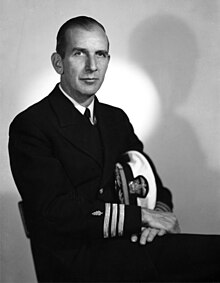Richard Shope
Richard Edwin Shope ( December 25, 1901 - October 2, 1966 ) was an American virologist .
Life
Shope was the son of a doctor and studied medicine at the University of Iowa . After graduating in 1924, he taught pharmacology there as an instructor . At that time he was mainly concerned with tuberculosis . From 1928 he was at Rockefeller University (then Rockefeller Institute) at their laboratories in Princeton , where he turned to virus research. During World War II he did research for the US Army and US Navy. From 1947 he was deputy director of the Merck Institute for Therapeutic Research. From 1952 he was back at Rockefeller University, this time in New York City .
Shope was the first to succeed in isolating the influenza virus for vaccinating animals against influenza . Shope was studying swine flu in the Midwest, first looking for a bacterium that he also found in the form of Haemophilus influenzae . On its own, the bacterium could not produce flu in healthy pigs, but it did produce a virus that he found. This triggered a mild form of the disease, which was only aggravated by the presence of the bacterium.
Since similar bacteria were also present in the human flu and Shope also knew that pigs were also infected in the great epidemic of 1918 , he concluded that the human flu was also caused by viruses. He found that survivors of the 1918 epidemic had antibodies against his swine flu, but not those with flu after the epidemic ended in 1920. He concluded that the swine flu he was investigating was a holdover from the 1918 epidemic. This later turned out to be incorrect, only certain antigens were identical. Using Shope's methods, a group led by Wilson Smith , Patrick Laidlaw and Christopher Andrewes succeeded in isolating the human flu virus (1933), which they were able to transmit to ferrets.
Shope also discovered links between viruses (in this case Papillomaviridae ) and tumors in rabbits. He found that viruses produced both a benign and a malignant tumor form there, and vaccination against the virus of the benign tumor variant produced immunity against the development of malignant tumors when vaccinated with the viruses of the malignant variant.
During the Second World War, he and colleagues developed a vaccine against rinderpest and he also found the first indications of antiviral effects in an antibiotic.
In 1957 he received the Albert Lasker Award for Clinical Medical Research and he received the Kober Medal of the Association of American Physicians and the US Army Legion of Merit . He was a member of the National Academy of Sciences , the American Philosophical Society and the American Academy of Arts and Sciences (1959).
literature
- Shope, Richard Edwin (1901-1966) , Biographical Memoirs of the National Academy of Sciences 50: 353-375.
Web links
- www.merriam-webster.com/medical/shope
- Portrait at Rockefeller University
- focus.de: Spanish flu
- Spanish flu
Individual evidence
- ^ Susan and Stanley Plotkin A short history of vaccination in Stanley Plotkin, Walter Orenstein, Paul Offit (editors) Vaccines , Elsevier, Saunders 2008
- ↑ Planet Knowledge, Spanish Flu
- ↑ Shope RE, Hurst EW: Infectious papillomatosis of rabbits: with a not on the histopathology . In: J. Med.. . 58, No. 5, 1933, pp. 607-624. PMID 19870596 .
- ↑ Portrait at Rockefeller University
| personal data | |
|---|---|
| SURNAME | Shope, Richard |
| ALTERNATIVE NAMES | Shope, Richard Edwin (full name) |
| BRIEF DESCRIPTION | American virologist |
| DATE OF BIRTH | December 25, 1901 |
| DATE OF DEATH | 2nd October 1966 |
